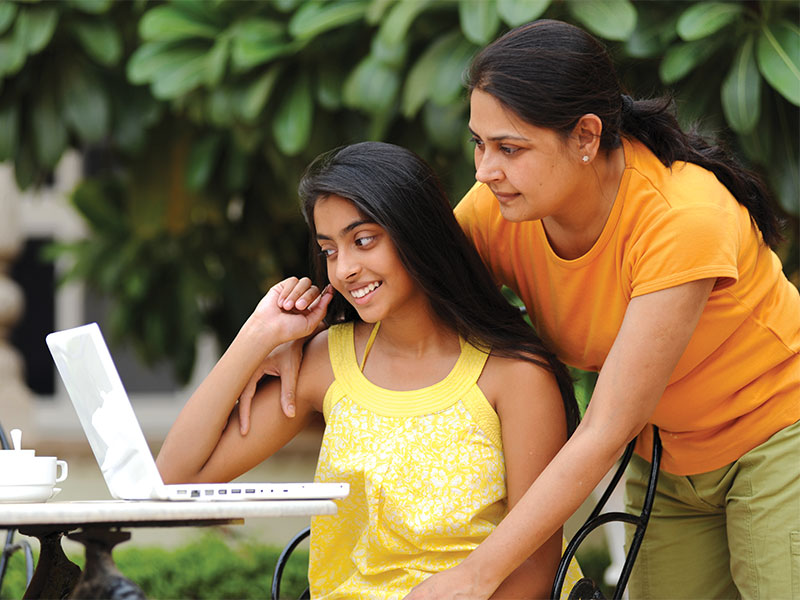An important duty of parents is to balance the right of teenage children to privacy with responsibility to ensure their safety

If there’s one issue which teenage children will fight tooth and nail, it’s their right to privacy — the freedom to spend their leisure time as they wish without nosy parents or siblings prying into their activities.
Unfortunately, there are times when adolescents aren’t engaging in activities they should be or they are doing things they shouldn’t be doing. In the past, the privacy issue revolved around whether parents should search children’s rooms or read their diaries. But today, there is the much more complicated issue of how much time children should spend on the Internet, cyber-bullying and the age-appropriateness of the websites they access.
Two common mistakes parents make while balancing children’s right to privacy and safety are:
• Abandon them by letting go too early (for example, not checking your middle schooler’s social media posts) before they are ready to handle responsibility.
• Second, let go too late (for example, insisting on reading all your teen’s texts), which disempowers children by denying them the freedom to use their judgement and discretion.
Here are some suggestions to ensure adolescents are given the privacy they deserve.
Know your children
Observe your child’s behaviour and be honest in your assessment. If she has already demonstrated maturity, then you need not monitor her too closely. Children who have made good decisions in the past are less likely to engage in risky or dangerous online behaviour in the future. But this isn’t an absolute. Children are works-in-progress, so be alert for behaviour that signals that you need to exert greater supervision.
On the other hand, if your children have a history of untrustworthiness, you should keep a closer eye on them. Turning a blind eye to their behaviour isn’t just irresponsible, it’s potentially dangerous. For instance, if they are staying out beyond curfew hours with a new group of friends, their plans are sketchy, and exam grades have dropped precipitously, you need to confront your teen directly about her behaviour and investigate illegal drug or alcohol usage.
Moreover you may need to follow up by searching her room for signs of substance abuse paraphernalia. Yes, you are invading her privacy but the prime objective is to keep her safe.
 Letting go over time
Letting go over time
Few things get a teen riled up faster than the feeling that she’s not being respected as an adult. Involving teenagers in creating an action plan that specifies limits of privacy you’re willing to grant, is a great way to accord respect and indicate your trust.
Explain to your teen that greater privacy is something she’ll have to earn and that greater responsibility will lead to more privileges and freedoms. For instance, when your teenager takes the trouble to introduce you to her friends and friends’ parents, you are more likely to allow her to spend more time at friends’ homes. Most teens are very responsive when you respect their right to privacy as an agreement between two mature individuals. Remember to uphold your end of the bargain as the agreement loses its value if your teen thinks you are untrustworthy.
Monitoring Internet/technology usage
A major concern of contemporary parents is keeping children safe on the Internet and monitoring their online activity. The best time to establish rules for new technology usage is when your child receives her first personal mobile/computer device. Make it clear from the start that her privacy on the tech device is limited — you’ll be checking what’s installed regularly, and perhaps even adding a monitoring app so you can track its location.
It’s worth making time to explain that you are setting these rules not because you don’t trust her but because it is your responsibility to keep her safe. Cite examples that are relevant to your child’s interests, such as using the GPS function to locate her if she is lost. This will help her associate monitoring with positive emotions instead as invasion of privacy.
At the same time, explain that there are things she can do to earn privileges. For example, if she finishes her homework on time, she will be allowed to use the tech device for additional time.
However, should things take a turn in the other direction, be prepared to revoke privileges to teach your child her responsibilities. If she seems to be lying about Internet use or suspicious patterns persist, don’t hesitate to resort to extreme measures. For instance, if you suspect she is skipping school — maybe you have found suspiciously coded text messages on her phone — you will have to make a judgement call about whether to read her diary, look through the school backpack, search her room, and/or contact the school.
An important duty of parents is to balance the right of teenage children to privacy with your responsibility to keep them safe. Remind them that as they show good judgement and trustworthiness, you will give them more freedoms and privacy, but the rope will be pulled back if they are putting themselves at risk. Your job as parents is to keep your children from harm’s way, even if that infringes their right to privacy and autonomy.
(Amy Williams is a US-based a journalist and former social worker — Excerpted and adapted from
https://centerforparentingeducation.org)























